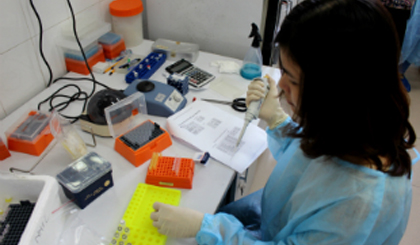Ebola virus disease laboratory diagnostics training course in Vietnam
A team of seven Vietnamese laboratory researchers has been trained to test for the Ebola virus disease as part of ongoing efforts of the Vietnamese Government and international partners to prepare for a possible case of Ebola virus disease in the country.
They came from the Virology Department of the National Institute of Hygiene and Epidemiology (NIHE), the Pasteur Institute in Ho Chi Minh city, the National Hospital for Tropical Diseases and the Tropical Diseases Hospitals in Ho Chi Minh city.
 |
Laboratory staff in Vietnam had not been trained to test for Ebola virus infection so far. Although the risk for the virus to spread to Vietnam is currently low, the World Health Organization’s (WHO) road map on Ebola recommends all countries, including Vietnam, to strengthen preparedness to rapidly detect and respond to an Ebola virus disease case.
The week long training course covered more than simply testing a sample for Ebola virus disease, but also how to handle samples of suspected Ebola case patients, how to store and transport them, and most importantly how to protect themselves when handling a sample. Safe transport of specimens is also important to reconfirm initial test findings at a reference laboratory outside of Vietnam.
The training course was the result of a longstanding partnership between the Japan International Cooperation Agency (JICA), the National Institute of Infectious Diseases of Japan, Nagasaki University, and the NIHE. Under the JICA-NIHE project, a Biosafety Level 3 laboratory facility has been built making it possible to test and diagnose a sample for Ebola virus isease in a safe environment.
The Biosafety level 3 or containment laboratory is specifically designed to work with higher risk pathogens. Some features include controlled access, directional airflow, usage of special personal protective equipment and biological safety cabinets. In addition, the Institute of Tropical Medicine, Nagasaki University (NEKKEN) hosted an Ebola virus disease laboratory training course in Japan and invited two Vietnamese researchers.
In addition to developing laboratory diagnostics capacity, the Vietnamese Government recently participated in an Ebola simulation exercise organized by WHO’s Western Pacific Regional Office. It also conducts regular risk assessment meetings and constantly monitors the global situation in its Emergency Operating Centre, highlighting the country’s firm commitment to prepare and respond to any possible case of Ebola in the country.
WHO has been working on strengthening laboratory capacity for emerging infectious diseases in line with the Asia Pacific Strategy for Emerging Diseases or APSED (2010). Such generic laboratory strengthening proves a valuable investment when capacity for emerging diseases such as Ebola needs to be established.
(Source: CPV)
 về đầu trang
về đầu trang






